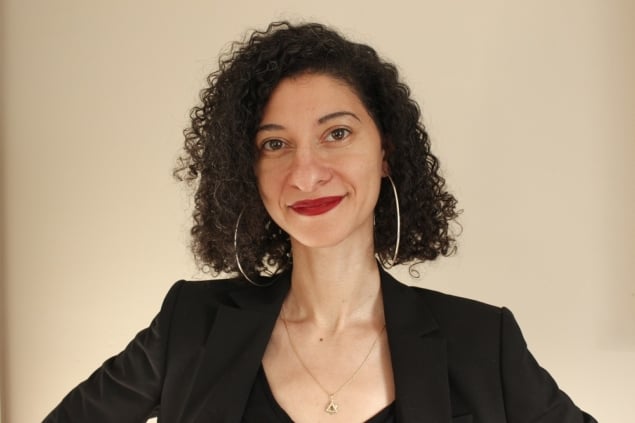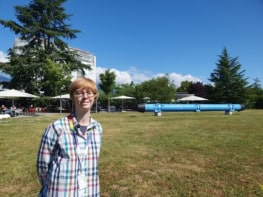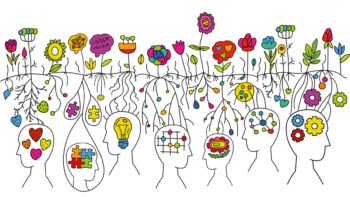This article is the sixth in a series of essays written by Black physicists and co-published with Physics Today as part of #BlackInPhysics week, an event dedicated to celebrating Black physicists and their contributions to the scientific community, and to revealing a more complete picture of what a physicist looks like.

Black physicists are an incredibly diverse group of people. Although we are often discussed as a monolith, we hold a range of ascribed identities, a spectrum of genders, sexualities and disability statuses. We come from a variety of socioeconomic backgrounds and geographical contexts, some of us are multigenerational university graduates while others are first generation. Many of us are descendants of kidnapped and enslaved Africans who were brought to the Americas; others are not and can trace their roots directly to a specific place on the African continent. In other words, we represent a rich array of histories, all under the proud moniker “Black”. Even so, we have a few things in common: a passion for the challenging intellectual work of physics, the burden of representation, and the social responsibilities of a physicist.
The question of representation is often reduced to playing mentor and role model. When we discuss what our responsibilities are as Black people in physics, they are usually along the lines of what we can do to “uplift the race” and show off our capacity to make contributions to physics. Even when we acknowledge that we must transcend above convincing white people that we too are made up of the exact same baryons that they are – with the same varieties of capability – we think primarily in terms of how to promote the individual dreams of other Black and under-represented groups in physics. We work to steward people through the obstacle course of academic and industrial racism and misogynoir (gendered anti-Black racism) and we may have elders, cousins and other family members who are depending on us to be financially stable and successful. We do all of this while fearing for our lives in the face of anti-Black police and vigilante violence on top of government policies that indicate our lives simply don’t matter.
These are hefty responsibilities and yet they are not the totality of our obligations. We are not just Black people in physics: we are Black physicists. This means the problems and responsibilities that fall at the feet of any physicist are also our own. In addition to being a Black queer and Jewish femme, I am also a theoretical particle cosmologist, meaning that my academic lineage is tied to the nuclear weapons development programme known as the Manhattan Project. The reason my area of research could develop with significant support from the US government was its ability to contribute to the US military-industrial complex. In this context, it is important to think carefully and clearly about the ethical implications of the work that I do, who I do that work with and with what money.
Because we face an array of structural barriers that sometimes feel Biblical in scale, it can be easy to say, “I can’t worry about that.” But worry about it we must. The same police forces for whom a routine traffic stop means not just giving someone a ticket but also a bullet wound have, in my lifetime, become more heavily armed and militarized. US police have received weapons and gear from the same Department of Defense that many physicists work for after they finish their degrees in physics and that many academic physicists take funding from to support their research. Police then deploy their new equipment against protestors who pour into the streets calling for justice for our brutalized and murdered community members.
Black physicists have a unique perspective that is rooted both in our experiences with oppression at the hands of our own government and our histories of triumph
I often tell my mentees that their responsibility is to survive and try to thrive because it is so incredibly hard to be a Black person in physics. Getting through the day while properly taking care of ourselves already feels like a major victory in a white supremacist, patriarchal world. Because I understand these challenges, for over a decade and a half, I volunteered for the National Society of Black Physicists, chairing the cosmology and gravitation committee and one year co-chairing our 500-person joint annual conference with the National Society of Hispanic Physicists. During those years, the military sponsored our meetings, military representatives attending the conference recruited Black students for summer internships and I made friends with people who were or have since become military contractors. Black communities, including historically Black colleges and universities, are fiscally robbed and underserved, a reality that the defence industry is aware of in its recruitment and partnership efforts. I knew that the money had helped a lot of people, me included. So, I made the choice to say nothing, despite being the sort of person who spoke to thousands at the Boston march against the Iraq War the night the invasion began.
Nearly 20 years later, that war seems endless. Many people have died, and my love for my community and desire to support myself and fellow Black physicists means that I have silenced my own moral impulses. But there is a price to pay for my silence, which as the Black feminist writer Audre Lorde said, will not protect us. Black physicists are perhaps particularly well positioned to understand this: from the impact on Black lives, we can see very clearly how social forces and economic circumstances can shape generations, and we know the specific cost of militarization to our communities.
A unique perspective
I now think more critically about the advice to survive and to individually thrive. Increasingly, I understand that it is not particularly progressive to support the presence of Black people in physics if all we do is assimilate into power structures without challenging the arrangements that underpin them. I don’t mean to suggest that it’s ever been the goal to look and sound like white physicists – although we do have our own internal debates about that. I’m talking about integrating into a scientific culture that has accepted the production of death as a tangential, necessary evil in order to gain funding. One that will march for science without asking what science does for or to the most marginalized people. One that still doesn’t teach ethics or critical history to its practitioners.
Importantly, a Black physicist can simultaneously be a barrier breaker and be part of a scientific story that should give us pause. A powerful example is Carolyn Beatrice Parker, the first Black woman to earn a postgraduate degree in physics. In 1953 Parker earned a Master’s degree from the Massachusetts Institute of Technology (MIT) in nuclear physics and six decades later, I joined MIT as a postdoctoral fellow. Parker almost certainly is one reason why that door was open to me. But it’s also the case that during the 1940s, Parker worked on the Dayton Project, the part of the Manhattan Project that focused on plutonium research.

Finding a way to belong: impostor syndrome and mental health
What does it mean for me to proclaim that Black Lives Matter, to believe colonialism in Africa (where materials for nuclear weapons have been mined) is wrong and to simultaneously claim a nuclear weapons researcher like Parker as an ancestor of great significance? What are the ethical implications of the new ideas we Black physicists are working on today – and the funding sources that support our work? We urgently need to have that discussion.
Black physicists have a unique perspective that is rooted both in our experiences with oppression at the hands of our own government and our histories of triumph. We can bring an important new ethical sensibility to the table. I don’t expect the conversation to be simple or for all of us to agree because we are a diverse community. But if we are going to talk about what it means to be Black in physics then what it means to wield the power of the physicist in a white supremacist, patriarchal, and colonialist world must be part of the conversation.
© Chanda Prescod-Weinstein 2020



